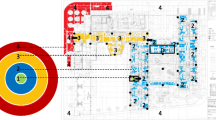Abstract
Ubiquitous sensing technology and statistical modeling technology are making it possible to conduct scientific research on our everyday lives. These technologies enable us to quantitatively observe and record everyday life phenomena and thus acquire reusable knowledge from the large-scale sensory data. This paper proposes a ”Spatio-temporal Semantic (STS) Mapping System,” which is a general framework for modeling human behavior in an everyday life environment. The STS mapping system consists of a wearable sensor for spatially and temporally measuring human behavior in an everyday setting together with Bayesian network modeling software to acquire and retarget the gathered knowledge on human behavior. We consider this STS mapping system from both the theoretical and practical viewpoints. The theoretical framework describes a behavioral model in terms of a random field or as a point process in spatial statistics. The practical aspect of this paper is concerned with a case study in which the proposed system is used to create a new type of playground equipment design that is safer for children, in order to demonstrate the practical effectiveness of the system. In this case study, we studied children’s behavior using a wireless wearable location-electromyography sensor that was developed by the authors, and then a behavioral model was constructed from the measured data. The case study shows that everyday life science can be used to improve product designs by measuring and modeling the way it is used.
Preview
Unable to display preview. Download preview PDF.
Similar content being viewed by others
References
Yang, G. (ed.): Body Sensor Networks. Springer, London (2005)
Higbtower, J., Borriello, G.: Location systems for ubiquitous computing. IEEE Computer 34(8), 57–66 (2001)
Parkinson, B., Spilker Jr, J. (eds.): Global Positioning System: Theory and Applications, vol.2, American Institute of Aeronautics and Astronautics, Inc. (1996)
Heywood, I., Cornelius, S., Carver, S.: Geographical Information Systems, 3rd edn., Pearson Education Limited (2006)
Cressie, N.: Statistics for Spatial Data. Revised edition, John Wiley & Sons, Inc., England (1993)
Stoyan, D., Kendall, W., Mecke, J.: Stochastic Geometry and its Applications, 2nd edn. John Wiley & Sons, Inc., England (1996)
Neapolitan, R. (ed.): Learning Bayesian Networks. Pearson Education, Inc. (2004)
Wallis, A., Cody, B., Mickalide, A.: Report to the nation: Trends in unintentional childhood injury mortality, 1987-2000 (2003), http://www.usa.safekids.org/content_documents/nskw03_report_OnlinePDF.pdf
WHO (ed.): Child and Adolescent Injury Prevention —A WHO Plan of Action (2006)
Nishida, Y., et al.: Methodology of everyday life computing and application to children injury prevention. In: FOCI 2007. The 1st IEEE Symposium on Foundations of Computational Intelligence, pp. 652–659 (2007)
Thrun, S., Burgard, W., Fox, D.: Probablistic Robotics. Oxford Universuty Press, Oxford (2005)
Motomura, Y.: Bayonet: Bayesian network on neural network. Foundation of Real-World Intelligence, 28–37 (2001)
Nishida, Y., Kawakami, G., Mizoguchi, H.: Everyday grasping behavior measurement with wearable electromyography. In: Sensors2006. The 5th IEEE Conference on Sensors, pp. 988–991 (2006)
Kawakami, G., Nishida, Y., Mizoguchi, H.: In situ measurement of playing children by wireless wearable electromyography. In: Sensors2007. The 6th IEEE Conference on Sensors, pp. 993–996 (2007)
Nishida, Y., et al.: 3D ultrasonic tagging system for observing human activity. In: IROS 2003. IEEE International Conference on Intelligent Robots and Systems, pp. 785–791 (2003)
Akaike, H.: Information theory and an extension of the maximum likelihood principle. In: 2nd International Symposium on Information Theory, pp. 267–281 (1973)
Author information
Authors and Affiliations
Editor information
Rights and permissions
Copyright information
© 2008 Springer-Verlag Berlin Heidelberg
About this paper
Cite this paper
Nishida, Y., Motomura, Y., Kawakami, G., Matsumoto, N., Mizoguchi, H. (2008). Spatio-temporal Semantic Map for Acquiring and Retargeting Knowledge on Everyday Life Behavior. In: Satoh, K., Inokuchi, A., Nagao, K., Kawamura, T. (eds) New Frontiers in Artificial Intelligence. JSAI 2007. Lecture Notes in Computer Science(), vol 4914. Springer, Berlin, Heidelberg. https://doi.org/10.1007/978-3-540-78197-4_8
Download citation
DOI: https://doi.org/10.1007/978-3-540-78197-4_8
Published:
Publisher Name: Springer, Berlin, Heidelberg
Print ISBN: 978-3-540-78196-7
Online ISBN: 978-3-540-78197-4
eBook Packages: Computer ScienceComputer Science (R0)




